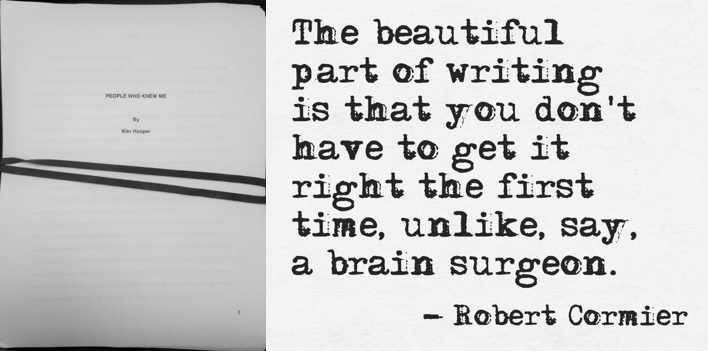Well, about a month after I received edits that sent me into a mild tailspin, I am done. The book is back with my editor. She will have it for a couple weeks, and then I’ll get another round of edits, which are supposed to be very minor. I have learned through this process not to hold my breath. Ha.
So, now that this supposedly-last round of major edits is done, what do I think of the book? That’s an easy question. It’s better. Much better. Readers will like it more. You may think that having gone through this process, I will welcome edits with open arms in the future, but I doubt that will happen. Receiving edits will always be slightly unnerving. See, when you send your book to your publisher, you think it’s the best it can be. You cannot fathom how it could be better. So, when you get big edits back, it makes you doubt your skill, like, “How did I not see that?” And, frankly, it’s very overwhelming to tackle work you couldn’t possibly anticipate or imagine. When I get defensive in response to editorial comments, it’s because I’m terrified and insecure. Plain and simple.
For a little comfort and inspiration, here are a few of my favorite quotes on the art of revision:
“I have rewritten — often several times — every word I have ever published. My pencils outlast their erasers.” — Vladimir Nabokov, Speak, Memory, 1966
Interviewer: How much rewriting do you do?
Hemingway: It depends. I rewrote the ending of Farewell to Arms, the last page of it, 39 times before I was satisfied.
Interviewer: Was there some technical problem there? What was it that had stumped you?
Hemingway: Getting the words right.
— Ernest Hemingway, The Paris Review Interview, 1956
“I don’t write easily or rapidly. My first draft usually has only a few elements worth keeping. I have to find what those are and build from them and throw out what doesn’t work, or what simply is not alive.” — Susan Sontag
“It takes me six months to do a story. I think it out and write it sentence by sentence — no first draft. I can’t write five words but that I can change seven.” — Dorothy Parker, The Paris Review Interview, 1956
“Put down everything that comes into your head and then you’re a writer. But an author is one who can judge his own stuff’s worth, without pity, and destroy most of it.” — Colette, Casual Chance, 1964
“Writing and rewriting are a constant search for what it is one is saying.” — John Updike
“By the time I am nearing the end of a story, the first part will have been reread and altered and corrected at least one hundred and fifty times. I am suspicious of both facility and speed. Good writing is essentially rewriting. I am positive of this.” — Roald Dahl
“The best advice I can give on this is, once it’s done, to put it away until you can read it with new eyes. Finish the short story, print it out, then put it in a drawer and write other things. When you’re ready, pick it up and read it, as if you’ve never read it before. If there are things you aren’t satisfied with as a reader, go in and fix them as a writer: that’s revision.” — Neil Gaiman
“Don’t look back until you’ve written an entire draft, just begin each day from the last sentence you wrote the preceding day. This prevents those cringing feelings, and means that you have a substantial body of work before you get down to the real work which is all in the edit.” — Will Self
